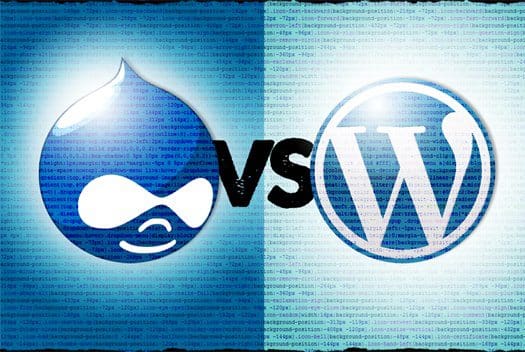
Drupal vs. WordPress: Content Management Battle Royale

In the blue corner, hailing from the University of Antwerp, with a community of more than 630,000 users and developers the Big Blue Drop, Druupaal. And in the white corner, wearing the multi-themed shorts, boasting over 65 million downloads The CMS Wonder, Woooooordpress.
Both of these content management systems (CMS) offer users heaping servings of versatility, but what might not be evident from their brief Bruce Bufferesque introductions is how they differ in some key areas.
Though WordPress is the more commonly known CMS, Drupal is actually a couple years older. Established in 1999, the Drupal software community was first offered as open source software in 2001. WordPress was released to the public in 2003 as an open source blogging platform.
With fairly approximate release times, it is worthwhile to give closer examination to how these two monuments of content managements paths have diverged and converged as they have grown into what they are now.
WordPress
- Originally created as a blogging platform which developed into a more inclusive CMS.
- Thousands of free themes for ease of use. Basic administration means a very small amount of developer skill needed, if any. Perfect for very lite websites.
- Good commercial support from a dedicated and diverse community answers easy to find.
- A massive catalog of plug-ins allows for simple integration into other web applications. Easy installation, as long as the version of WP is up-to-date.
- Roles and permissions structures can make it difficult to manage websites with various and complex content types.
- Easy to update, easy to use, low maintenance.
Drupal
- Began as a message board developers used to share ideas and then evolved into a more robust content management system.
- Modules are the backbone of Drupal; though these require a more intensive approach they offer webmasters more options.
- Community is the key Drupal has one of the largest communities of users and developers contributing to the extremely fast growth of the open source CMS.
- Works well with a wide range of content types, user controls and permissions are simple to assign/manage.
- Plenty of plug-ins and modules make it versatile; however, application of tools can be more work intensive.
- More difficult to update because it is a more sophisticated CMS, but highly functional websites result in bigger payoffs.
In conclusion the systems are both quite similar in their offerings, tools and community. Where they differ is the amount of time and expertise it takes to build and manage a website properly.
WordPress is easy to use for lite website production, whereas Drupal is a more in-depth system for websites with diverse content types and structures. A WordPress website allows for faster and easier releases, but with a little more effort and time a Drupal website can integrate into a website a higher level of functionality for an improved user experience.
In the end it comes down to what is the right tool for the job. You don’t need a sledgehammer to crack an egg and you wouldnt use a cooked noodle to weave a winter sweater.
If you find yourself battling with what CMS is the best fit for your website feel free to drop us a line today our developers are Drupal and WordPress pros.